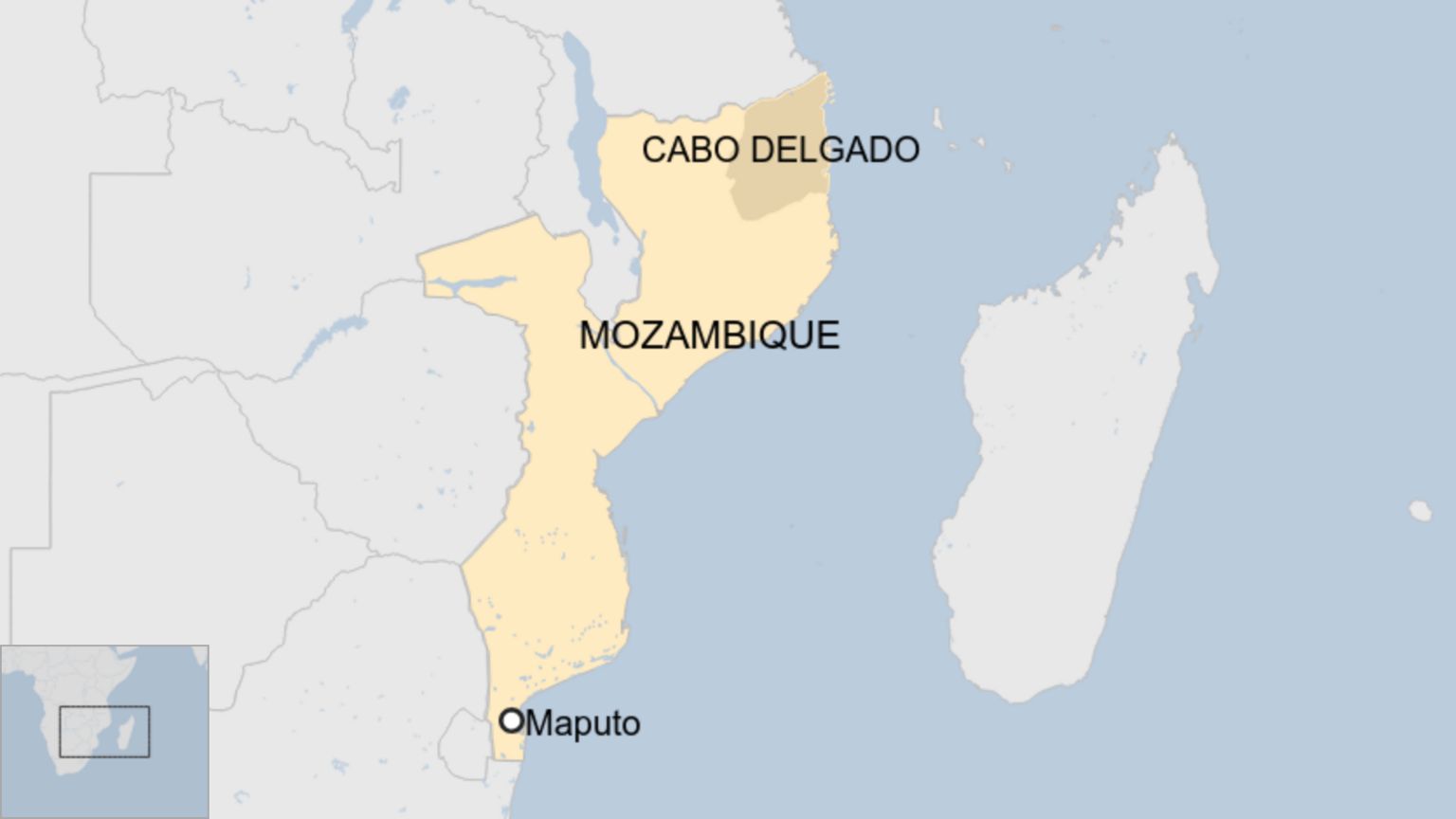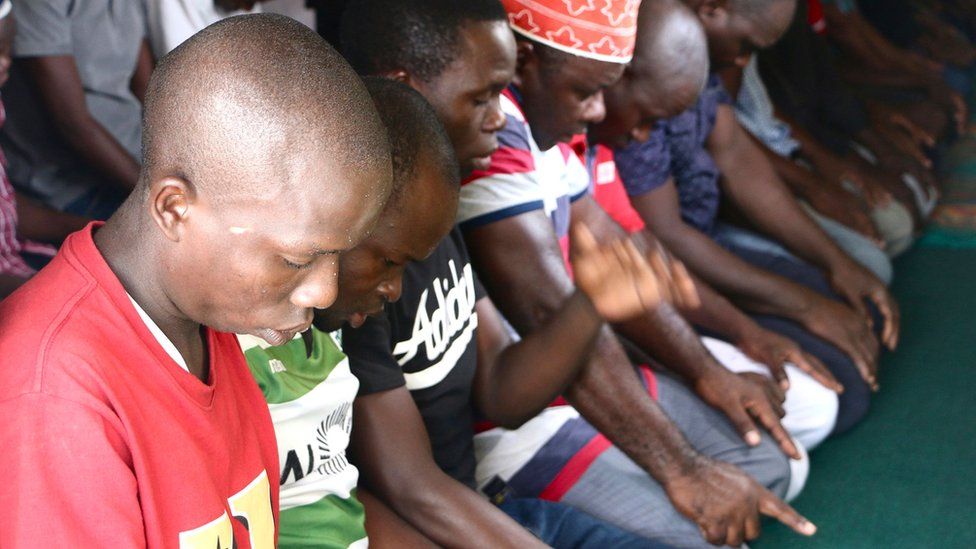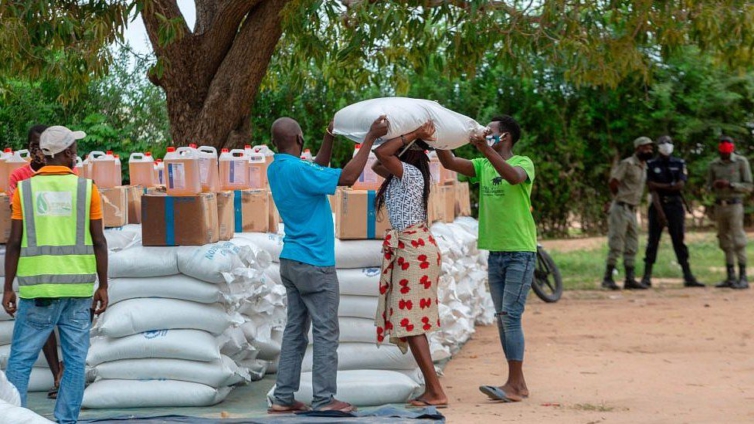Aid agency Save the Children says Islamist militants are beheading children as young as 11 in Mozambique's northern province of Cabo Delgado.
One mother told the agency she had had to watch as her 12-year-old son was killed in this way close to where she was hiding with her other children.
More than 2,500 people have been killed and 700,000 have fled their homes since an Islamist insurgency began in 2017.
The militants have pledged allegiance to the Islamic State (IS) group.
In its report, Save the Children said it had spoken to displaced families who reported gruesome scenes in the gas-rich province.
What did they say?
One mother, whose name was withheld to protect her identity, said her eldest child had been beheaded near where she and her other children were hiding.
"That night our village was attacked and houses were burned," she said.
"When it all started, I was at home with my four children. We tried to escape to the woods but they took my eldest son and beheaded him. We couldn't do anything because we would be killed too."
Another woman said her son had been killed by militants while she and her other three children had been forced to flee.
"After my 11-year-old son was killed, we understood that it was no longer safe to stay in my village," she said.
"We fled to my father's house in another village, but a few days later the attacks started there too."
Chance Briggs, Save the Children's country director in Mozambique, said the reports of attacks on children "sicken us to our core".
"Our staff have been brought to tears when hearing the stories of suffering told by mothers in displacement camps," he said.
The United Nations special rapporteur on extra-judicial executions described the militants' actions as "cruel beyond words".
Who are the militants?
The insurgents are known locally as al-Shabab, which means The Youth in Arabic. This reflects that it receives its support mostly from young unemployed people in the predominantly Muslim region of Cabo Delgado.

A group with a similar name has existed in Somalia for more than a decade. It is affiliated to al-Qaeda, unlike the Mozambican group which allied itself with the rival IS movement in 2019.
IS sees the insurgents as being part of what it calls its Central Africa Province. It released images last year showing fighters in Cabo Delgado with AK-47 rifles and rocket propelled grenades.
This alarmed counter-terrorism experts, as it suggested that global jihadists were exploiting a local insurgency for their own gains.
What do the insurgents want?
Some analysts believe the insurgency's roots lay in socio-economic grievances, with many locals complaining that they have benefited little from the province's ruby and gas industries.

In a video last year, one militant leader said: "We occupy [the towns] to show that the government of the day is unfair. It humiliates the poor and gives the profit to the bosses."
The man spoke about Islam and his desire for an "Islamic government, not a government of unbelievers", but he also cited alleged abuses by Mozambique's military, and repeatedly complained that the government was "unfair".
Mr Briggs told the BBC World Service it was difficult to determine their exact motivations as they did not have a manifesto.
"They co-opt young people in to joining them as conscripts and if they refuse they are killed and sometimes beheaded. It's really hard to see what is the end game."
After visiting Cabo Delgado's capital Pemba last year, a delegation from the South African Bishop's Conference said that "almost everyone spoken to agrees that the war is about multinational corporations gaining control of the province's mineral and gas resources".
What is Cabo Delgado like?
Cabo Delgado is one of the poorest provinces in Mozambique.
Discoveries of a huge ruby deposit and a giant gas field in 2009-10, raised hopes of jobs and a better life for many local people, but those hopes were soon dashed.
It was alleged that any benefits were being taken by a small elite in the Frelimo party, which has governed Mozambique since independence in 1975.
New Islamist preachers, both East Africans and Mozambicans trained abroad, established mosques and argued that local imams were allied to Frelimo and its grab for wealth.
Some of these new mosques provided money to help local people start business and create jobs - and the Islamists argued the society would be fairer under Sharia.
This proved attractive to youth, who form the backbone of the insurgency.
What has been the government's response?
Its main focus is on seeking a military solution, but its army is poorly equipped to combat the insurgency.
On Monday, US embassy officials in the capital, Maputo, said American military personnel would spend two months training soldiers, as well as providing "medical and communications equipment".
The US intervention follows reports that Mozambique had recruited Russian and South African mercenaries to help fight the militants.
Latest Stories
-
EBID wins the Africa Sustainability Award
41 minutes -
Expansion Drive: Takoradi Technical University increases faculties
5 hours -
SHS heads demand payment of outstanding funds before reopening of schools
6 hours -
We thank God for the 2024 general elections – Akufo-Addo
6 hours -
Coconut Grove Beach Resort marks 30 years of excellence with memorable 9 lessons & carols service
6 hours -
WAFU B U-17 Girls’ Cup: Black Maidens beat Nigeria on penalties to win inaugral tournament
7 hours -
Real Madrid beat Sevilla to keep pressure on leaders Atletico
8 hours -
Liverpool put six past Spurs to go four points clear
8 hours -
Manchester United lose 3-0 at home to Bournemouth yet again
8 hours -
CHAN 2024Q: ‘It’s still an open game’ – Didi on Ghana’s draw with Nigeria
8 hours -
CHAN 2024Q: Ghana’s Black Galaxies held by Nigeria in first-leg tie
9 hours -
Dr Nduom hopeful defunct GN bank will be restored under Mahama administration
10 hours -
Bridget Bonnie celebrates NDC Victory, champions hope for women and youth
10 hours -
Shamima Muslim urges youth to lead Ghana’s renewal at 18Plus4NDC anniversary
11 hours -
Akufo-Addo condemns post-election violence, blames NDC
11 hours

